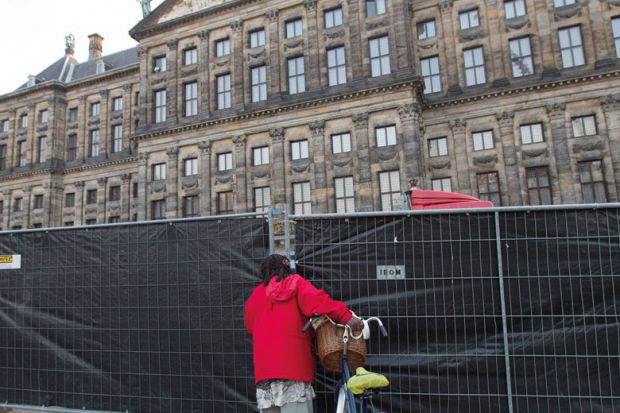Academics in the Netherlands are protesting against contracts that they say lead to constant overtime and work above their pay grade, stunting the development of early career researchers.
The AOb trade union has been collecting examples of so-called contract inflation since last December.
“The tasks [staff] do would much better fit in a higher-tiered contract or job, or the amount of tasks that they get assigned don’t fit the amount of hours that they actually are employed for,” said Richard de Boer, a lecturer at the University of Amsterdam (UvA) and an AOb board member.
Misha Velthuis, who teaches at the university, described the practice: “Someone says, ‘This teacher is leaving. We have trouble finding a replacement at short notice.’ You’re eager as a young academic to step up: ‘I’ve been reading about this topic for years – let me do this.’”
Dr Velthuis was among what organisers said was a crowd of 150 demonstrators outside UvA’s administrative headquarters in the centre of Amsterdam on 1 April, part of a national protest against the casualisation of academic work.
One group at the protest, Casual UvA, said junior lecturers and some permanent staff at the university had committed to a marking strike to press their demands for permanent contracts for junior staff, investment in professional development and workload transparency.
“It’s doing work that you’re not paid for – that is exploitation,” said Dr Velthuis, who explained that he was employed on a tutoring contract but actually worked as a lecturer, preparing and teaching much larger classes.
Being paid as an entry-level university teacher meant that he could not secure a mortgage, while the extra work involved left him no time to publish and, thus, advance in his career, he said. “The exploitation makes it impossible to actually comply with the only criteria that matter in academia,” he added.
A UvA representative said that working overtime was “something that occurs throughout all universities in the Netherlands” and that declining government funding per student was to blame. She said the university had been “one of the first to raise this issue with the government” back in 2018.
Marijtje Jongsma, the AOb’s lead on academic education and research and a professor at Radboud University Nijmegen, said contract inflation had emerged as an issue in the past five years as universities sought to cut costs amid falling funding. “There’s pretty much nothing you can do because in every individual case it’s not illegal,” she said.
Academics can request a new contract if they believe their tasks belong to a higher level, but few felt comfortable making the case, Professor Jongsma said.
“First of all, you’d never dare to do that because you’re just deliriously happy that you have actually got a contract, even if it’s fixed-term and at a lower level,” she said.
Dr de Boer said that of the 28 contract inflation complaints the union had so far received from academics, 60 per cent said they were on temporary contracts but were performing tasks belonging to a permanent role, while half said they had been hired at a junior position but were doing a higher-tier job.
Dr Velthuis said he wanted paid time in the week to undertake non-teaching activities, such as working on the publications that would help him to advance. “The step you need to make to move up in your career can only be made at your own expense. I don’t know if any other industry would work like that,” he added.
Some early career academics are seeking out more stable employment, even as governments try to change laws to tackle precarity, a phenomenon that campaigners say often hurts those who are already disadvantaged.
Register to continue
Why register?
- Registration is free and only takes a moment
- Once registered, you can read 3 articles a month
- Sign up for our newsletter
Subscribe
Or subscribe for unlimited access to:
- Unlimited access to news, views, insights & reviews
- Digital editions
- Digital access to THE’s university and college rankings analysis
Already registered or a current subscriber? Login












